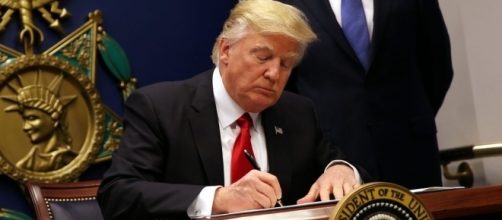After a brief, one-day stint as a calm and level-headed leader, President Donald Trump is back to his old tricks as he signs a new executive order banning travellers (even those with valid travel documents) from six countries: Yemen, Libya, Syria, Sudan, Somalia, and Iran. The only difference between this and the only travel ban is that this time he’s dropped Iraq from the list. That was nice of him, given that America invaded Iraq after 9/11, which Iraq had nothing at all to do with.
The ban will begin on 16 March
Trump’s new travel ban will be effective as of 16 March and will last for 90 days.
His 90-day ban on refugees entering the United States will also be reinstated, but he will no longer be permanently banning refugees specifically from Syria. Again, how very nice of him.
The federal court who saved the day last time have ruled that this ban is hunky dory as a replacement for Trump’s previous ban, so that’s a really great victory for democracy. One less country and slightly less scrutiny and prejudice, but it’s still basically the same and we’re back to square one.
Trump’s signing of the new deal came hot on the heels of the emerging news that the FBI are currently investigating 300 refugees with ties to ISIL (one letter off the one everyone’s scared of, but still pretty scary).
Legal action threatened against new ban
Now that people know Trump’s travel bans mean squat and they can be easily overthrown, a lot of law officials are threatening legal action. New York Attorney General Eric Schneiderman has vowed to challenge the new ban. Schneiderman says that although “the White House may have made changes to the ban, the intent to discriminate against Muslims remains clear,” and that’s something he won’t stand for. He used some beautiful words during his anti-Trump diatribe, calling the President’s policies “draconian” and describing them as “diametrically opposed” to good, wholesome values. Beautiful.
According to Sean Spicer, Trump’s new travel ban “will keep the nation safe.” Will it, Sean?
As a way of feebly currying favour for the ban since it was so unpopular last time, Homeland Security decided to use this opportunity to announce their investigation into 300 refugees who had been found to have links to the Islamic State via a thousand counterterrorism investigations they were carrying out.

